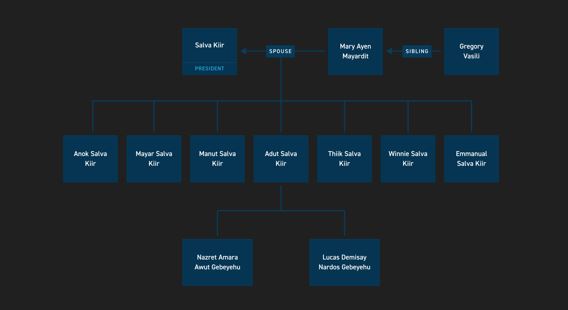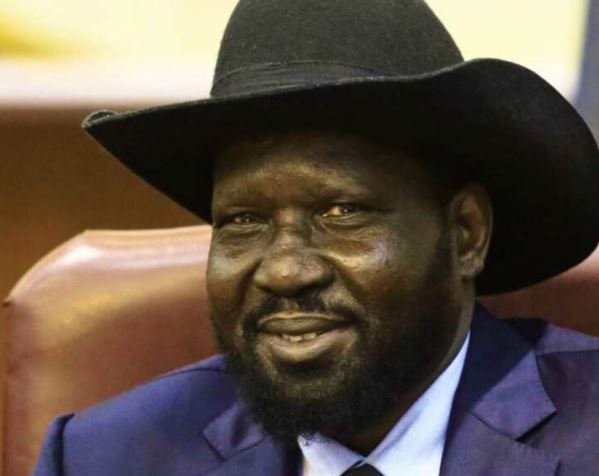The Sentry on Monday published a massive trove of data exposing the control by the family of South Sudan President Salva Kiir over a secret business empire.
“Kiirdom: The Sprawling Corporate Kingdom of South Sudan’s First Family,” provides a deep dive into the first family’s private capture of assets across South Sudan’s major national economic sectors including petroleum, mining, banking, trade, aviation, logistics, and private security.
The Sentry is an investigative and policy organization that seeks to disable multinational predatory networks that benefit from violent conflict, repression, and kleptocracy.
According to a press statement extended to Radio Tamazuj on Monday evening, the exposé published on The Sentry’s new interactive Atlas platform, “Kiirdom” combines extensive documentation from the South Sudan Ministry of Justice with the findings from numerous original investigations by The Sentry.
John Prendergast, Co-Founder of The Sentry, said that since independence, rather than work toward a secure and prosperous future, the Kiir regime has orchestrated destabilization, repression, violent conflict, and mass starvation while consolidating a lucrative corporate empire.
“The first family has deployed an array of circumvention techniques to veil from the public their businesses and assets,” he stated.
“Kiirdom” provides the full scope of collected data plus expert analysis in a freely available and interactive format.
“The Sentry’s new open-data platform, Atlas, illuminates the business empires, facilitators, and financing mechanisms of global networks of kleptocrats, conflict financiers, and war profiteers. Atlas functions as a deep dive into the nuts and bolts of a kleptocracy, aiming to facilitate public scrutiny, transparency, and accountability for these elites and their enablers. Said Michelle Kendler-Kretsch, Investigations Manager for The Sentry. “By providing an interactive visualization tool, easy-to-use search, expert analysis, and detailed profiles of individuals and entities, Atlas empowers journalists, policymakers, financial institutions, and the public to hold those responsible for large-scale violence and grand corruption accountable. Atlas projects are designed to be dynamic, enabling us to nimbly combat corruption through regular updates.”

Selected revelations and highlights in “Kiirdom”
Based on the 126 companies mapped by The Sentry, the corporate network of Kiir’s family includes high-profile businesspeople and politicians from around the region, as well as members of the military and National Security Service, both of which have engaged in gross human rights violations.
“Several companies that included Kiir family members in their lists of shareholders received public contracts or letters of credit, which are essentially guarantees from a bank to a seller that they’ll be paid by the buyer,” the statement reads in part. “The Sentry, in examining these companies, identified a number of red flags for trade-based money laundering. “The children and grandchildren of Kiir and his brother-in-law, Gregory Vasili, served as founding shareholders for a number of companies when they were still minors.”
The Sentry identified 70 companies with foreign shareholders in which members of the Kiir family also held shares. Foreigners can own businesses in South Sudan, but the 2012 Companies Act mandates that South Sudanese nationals hold at least 31 percent of the shares. While these requirements can support local South Sudanese economic interests, they can also create an advantage for companies with connections to the political elite.
“The ‘Kiirdom’ project is designed to enable the South Sudanese people to know what kind of Business Empire Kiir has built for himself and his family,” The Sentry statement said. “It is also intended to support public scrutiny and compliance processes meant to mitigate against corruption risks, thereby ensuring that Kiir-connected companies and family members face enhanced due diligence commensurate with their risk profiles.”
South Sudan’s constitution prohibits high-ranking officials and other constitutional officeholders from being involved in commercial business or receiving renumeration from any source other than the national government. However, this constitutional provision is often circumvented by having family members of officials listed as the shareholders of companies.
Despite the provision also requiring that these officeholders make a declaration of their assets and liabilities, including those of their spouses and children, such declarations—when they actually occur—often remain confidential and are not subject to public scrutiny.
The Sentry’s Atlas includes a visual interface to explore and learn about the companies, banks, and individuals linked to the first family’s business empire. The “Network Insights” sections explain the various means and methods that the Kiir family used in building their business empire, including specific transactions, industries, companies, facilitators, and associates.
Read the full report, the “Kiirdom” project, on The Sentry’s Atlas platform: https://atlas.thesentry.org/kiirdom/
Kiir’s family could not immediately be reached for comment on the new report.




